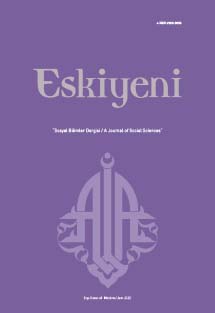Mevlânâ’nın Mesnevî’sinde Gece Sembolü
Night Symbol in Mawlānā’s Mathnawī
Author(s): Hamide Ulupınar, Betül GürerSubject(s): Theology and Religion, Islam studies, Qur’anic studies
Published by: Anadolu İlahiyat Akademisi
Keywords: Sufism; Mawlānā; Mathnawī; Night; Symbol;
Summary/Abstract: Time has been among the most fundamental subjects in the history of thought with many aspects such as discovering its truth, making sense of it, and managing it. The night, which is the opposite of the daylight and tells about the dark period, has been given great importance by humanity as it covers half of a person’s life and greatly affects the biological and spiritual dimensions of life. Although daytime is a time of light and busyness, it has been seen that night is mentioned more often in the Qur’ān, and considered as the time period on which Allah has sworn and a verse of His existence. In the verses, the night is used in the real sense as “time to rest, a revelation to the prophets, destruction, separation of wise works from others, time to hide, worship and walk/leave”, and metaphorically in the meanings of “darkness”, “heedlessness” and “cover”. This study aims to determine the symbolic meanings of the concept of the night in Mawlānā’s Mathnawī and to reveal the place of the concept in Islamic tradition and Sufi culture. The night has not been the subject of academic studies to the extent necessary. It is seen that existing studies on the night focus on its meanings in the Qur'an, concepts and actions related to the night, the virtue of the blessed nights and its use in hadiths. In the studies on Mawlānā, only the night in Mawlānā’s rubais has been discussed in terms of the method of sayr u suluk (journeying and initiation). Therefore, this study aims to fill the gap in determining the symbolic meanings of night, which is half the time, gained in Mawlānā’s Mathnawī and the place of these symbols in Islamic tradition. Mawlānā mostly used the word “night” in the real sense in Mathnawī. Night expresses the negative time with the symbols of " darkness/darkness of human nature, heedlessness, veil" when describing the moment when there is no action, and the positive time with the symbols of "taking the way / being on the road / meeting (vuslat)" when describing the moment of action when man tries to open the door to the truth. These meanings/symbols and usage patterns that Mawlānā attributed to the night in his Mathnawī have been enriched by being inspired by the usage and meaning in the Qur’ān, and are explained through symbols such as deepening and traveling in the night / in the moment / in the concept.
Journal: Eskiyeni
- Issue Year: 2023
- Issue No: 49
- Page Range: 501-517
- Page Count: 17
- Language: Turkish

